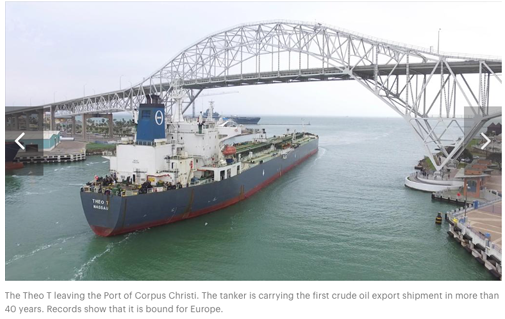 Unless you were watching the budget process in Congress late in 2015, you probably missed a small piece of the legislation passed by the House, Senate, and signed by the President that lifted a 40-year ban on the export of US crude oil. The lifting of the ban is great news for the industrial construction industry and will make the construction of LNG plants and port expansions a reality over the next five to eight years.
Unless you were watching the budget process in Congress late in 2015, you probably missed a small piece of the legislation passed by the House, Senate, and signed by the President that lifted a 40-year ban on the export of US crude oil. The lifting of the ban is great news for the industrial construction industry and will make the construction of LNG plants and port expansions a reality over the next five to eight years.
The original export ban was imposed in 1975 as a response to the 1973 Arab Oil embargo against the US that was precipitated when the Nixon administration supplied arms to the Israelis during the 1973-74 Arab Israeli or Yom Kippur War. That Arab embargo scared the Nixon Administration and created long lines at the pump. Congress, in response to the Embargo, passed the ban to begin to move the US towards energy independence.
The US has made major strides towards becoming truly energy independent through new discoveries and the use of new technologies in the oil field. Those decades long changes have made the US the largest producer of oil in the world, surpassing even the Arab states.
The lifting of the ban, advocated and lobbied for by all of the “Bigs” in the oil and gas industry for years, will result in the construction of new facilities on the Gulf Coast, valued by some to be as high as $23 billion. These are long-term plans as the permitting for these plants can take 3-4 years, and the design and construction can add another 5-8 years to the entire process. Now that the ban has been lifted, the new plants can be completed and shipments can get underway. The key now is to get the plants built, and the demand for skilled workers to build these plants will skyrocket over the next 5 years.
According to the San Antonio Business Journal, the first shipment of crude from the Eagle Ford Shale was exported from the Port of Corpus Christi at the first of 2016, bound for the coast of Italy to satisfy a contract that Conoco-Phillips has with Vitol. In addition to the crude exports authorized by the lifting of the ban, the construction of additional LNG plants and “trains” as they are called, will increase production of product for export. The demand for skilled workers has already exposed a major shortage of workers in the Gulf region. According to several sources, the demand for construction workers to build the plants currently permitted will reach 23,000 in 2017 and 2018. The industry is scrambling to find workers to complete the new plants. The Liquefied Natural Gas (LNG) and Compressed Natural Gas (CNG) shipments to Europe will help our allies and trading partners offset their reliance on Russia for gas.
The lifting of the ban was a major win for the US, for the construction industry workers, and for the Oil and Gas industry, which is currently facing the lowest “price at the pump” in over a decade and undergoing massive layoffs, both in the field and in the offices of companies all across the country.


